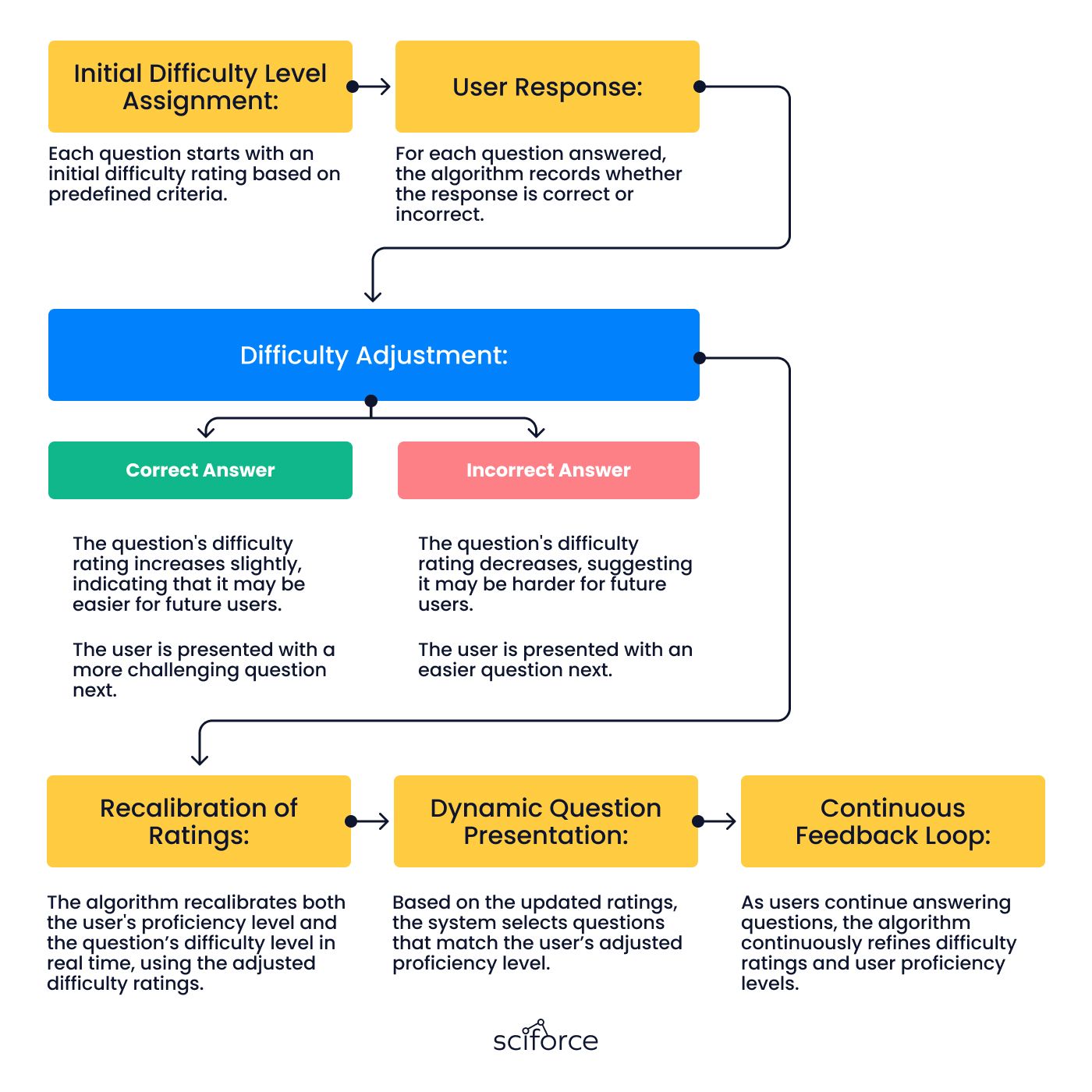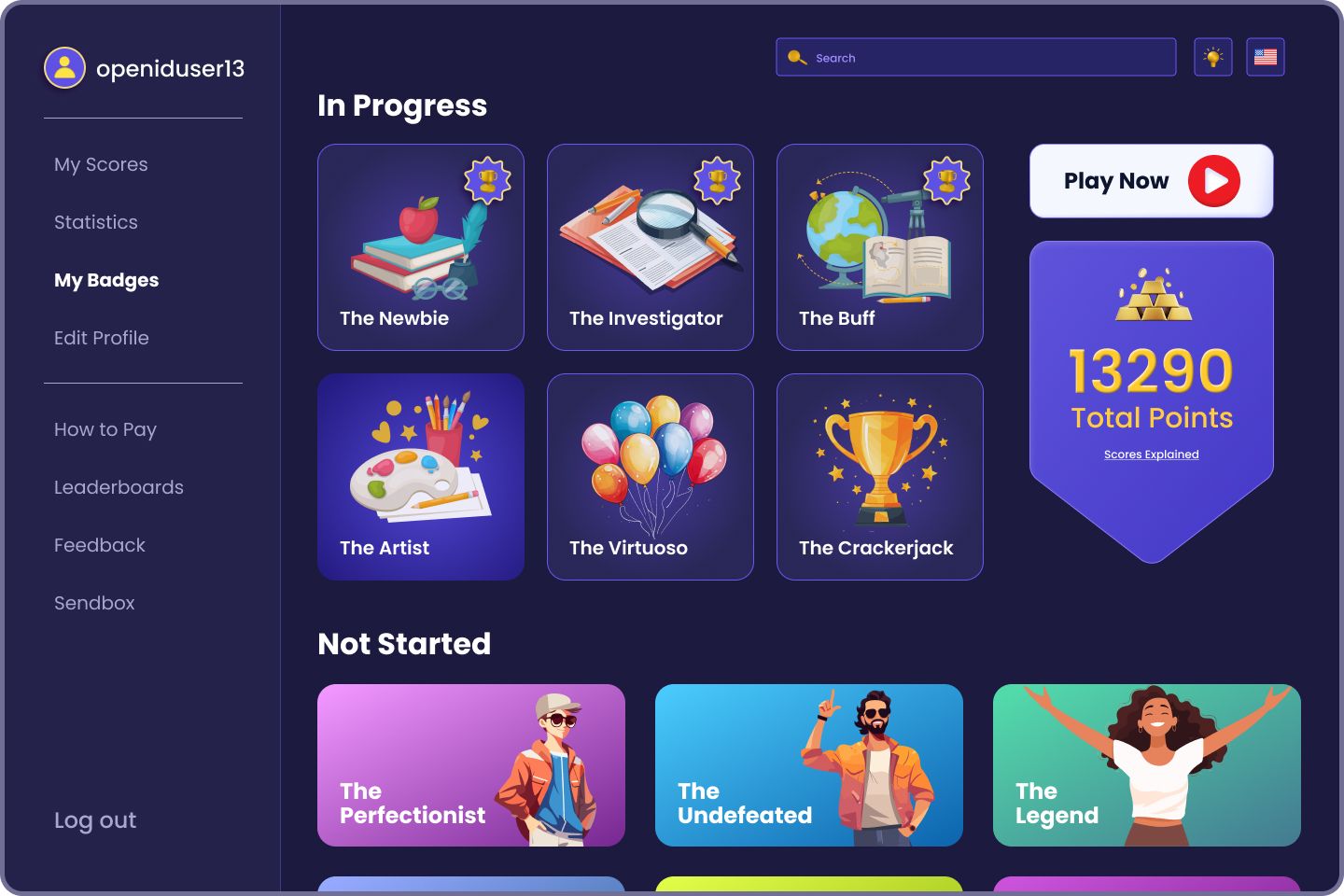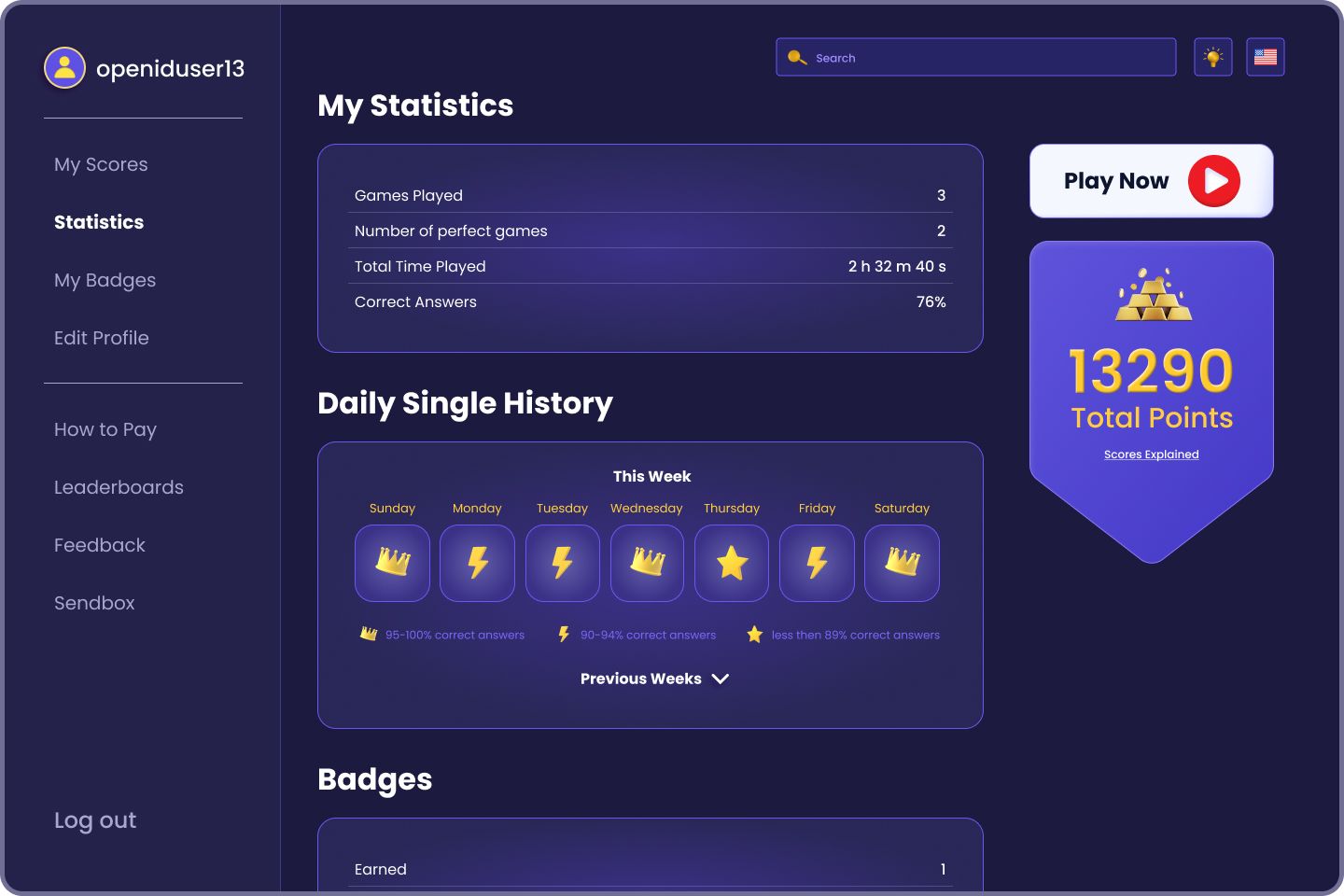Our client is a U.S.-based EdTech company offering language learning products in over 100 languages. Their platform includes interactive courses and games that adjust question difficulty in real time based on user performance, using an algorithm similar to the ELO rating system. The company also reviews user data to spot learning difficulties and improve their content, offering a more effective approach to language education.
Scalability and Performance
The platform needed to support a large number of users engaging simultaneously without compromising speed or functionality. Ensuring the system could handle high loads while maintaining real-time response and dynamic question adjustments was a key technical challenge.
Dynamic Difficulty Adjustment
Creating a system that could automatically adjust question difficulty based on user responses required extensive testing and fine-tuning to ensure it accurately assessed each question's difficulty. The key challenge was making the system adapt fairly to users of all skill levels, providing a balanced and engaging experience for everyone.
Real-Time Adaptation
The system had to instantly modify the difficulty of each subsequent question based on whether the previous one was answered correctly or incorrectly. This real-time adaptation required efficient processing and a robust algorithm to maintain a seamless learning experience without delays.
Data Management and Analysis
Developing a comprehensive admin panel to track detailed user data, including performance metrics and question difficulty ratings, was essential. This functionality allowed the client to gain valuable insights into user behavior and question effectiveness, supporting continuous improvement of the platform’s content.
Integration with Existing Systems
Integrating the new features and algorithms into the existing platform required careful coordination to avoid disruptions. This included refactoring legacy code and updating the tech stack to ensure compatibility and stability across all components.
Backend Optimization
Configured Redis to store frequently accessed data, reducing database strain and speeding up response times and used Varnish to cache web pages, lightening server load and improving page loading speeds. We set up RabbitMQ and Celery to manage background tasks like user activity tracking, while optimized MySQL queries ensure efficient performance during high traffic.
Adaptive Learning System
Implemented an algorithm inspired by the ELO rating system to rank and modify the level of challenge in real time. As users answered questions correctly or incorrectly, the system recalibrated the difficulty level, presenting easier or more challenging questions accordingly.

User Experience Enhancement
Revamped the user interface to create a more engaging and intuitive experience. Features like gamification, leaderboards, and progress tracking were integrated to motivate users and maintain high levels of engagement.
Data Analytics and Insights
Enhanced the admin panel with advanced filtering options to sort user data by activity, proficiency, and engagement levels. Custom reporting tools provide detailed performance reports and trend visualizations. Real-time dashboards display user behavior, question difficulty ratings, and completion rates, while historical data visualization shows how these ratings have changed over time, helping the client identify learning patterns and refine content strategies.
Seamless Feature Integration
To improve efficiency and reduce technical debt, we streamlined legacy code before transitioning the platform to a modern tech stack with updated libraries and frameworks. Added new features, like dynamic difficulty adjustment and real-time analytics, while ensuring smooth compatibility with the existing system architecture.
Dynamic Difficulty Adjustment
The system continuously monitors user responses, adjusting question difficulty based on accuracy and response time. For each answer, it recalibrates difficulty ratings and adjusts the sequence and complexity of upcoming questions, keeping users engaged with challenges that match their skill level and preventing frustration or boredom.
Real-Time Leaderboards
User rankings appear in real time, with scores and positions shifting instantly as participants answer questions. Top performers stand out, and recent ranking changes are highlighted to keep the competition active. Tracking progress and showcasing achievements helps users stay motivated and focused on improving their performance.
Comprehensive Admin Panel
Offers advanced filtering, custom reporting, and real-time data visualization. Administrators can track user behavior, question performance, and engagement metrics, providing valuable insights for optimizing content and identifying learning trends.
Gamification Elements
Includes achievement badges for milestones like completing a set number of questions or maintaining a daily streak. Progress tracking displays detailed stats on accuracy, speed, and areas for improvement, giving users clear goals to work toward. Rewards for consistent participation, such as unlocking new levels or earning bonus points, encourage users to stay engaged.
Multi-Language Support
Supports all languages, enabling users to learn and practice in their native or target language, including hieroglyph-based scripts like Chinese and Japanese, and right-to-left scripts such as Arabic and Hebrew. It dynamically adjusts the interface and navigation to suit each language, providing a seamless and effective learning experience, regardless of the language’s specifics.

Initial Code Refactoring
The team reviewed and restructured the existing codebase to eliminate redundancies and streamline functionality: optimizing key modules, reducing technical debt, and improving overall code quality, making the system more efficient and easier to maintain.
Tech Stack Update
The team upgraded the platform to the latest versions of Django and MySQL for better performance and security. Modern libraries were integrated for improved data processing and frontend functionality.
User Interface Update
We redesigned the interface and added gamification elements, with dynamic leaderboards now displaying real-time rankings, while progress tracking shows detailed stats on user performance, such as accuracy and speed. The system rewards the active users with achievement badges were added for milestones like daily streaks and question mastery.

Implementing Dynamic Difficulty System
We created an adaptive algorithm inspired by the ELO rating system that adjusts question difficulty based on user performance. The system presents easier or harder questions depending on whether users answer correctly or incorrectly. We refined the algorithm using data from thousands of user responses to ensure accurate difficulty levels and a balanced learning experience.
Performance Optimization for High User Loads
To handle increased traffic, we optimized database queries, used Redis to cache frequently accessed data, and implemented Varnish to reduce server requests and speed up page loads. RabbitMQ and Celery managed tasks like user activity logging and report generation, ensuring smooth performance without impacting user experience, even during peak usage.
Admin Panel Development
We built a detailed admin panel with advanced filtering options to sort user data by activity, accuracy, and engagement. Real-time dashboards display metrics such as question difficulty ratings, user performance trends, and completion rates. Custom reporting tools allow the client to generate specific reports on user progress, session duration, and challenging topics. This data is used to refine their learning content
Multi-Language Support Research and Planning
The team conducted in-depth research on adding support for additional languages, addressing unique grammar rules, sentence structures, and cultural nuances. A flexible architecture was designed to handle complex language-specific features, such as character-based input for Mandarin and right-to-left text for Arabic.
Scalability and Performance
The project successfully transformed the platform into a robust and scalable solution. Performance optimizations enabled the system to handle over 20,000 daily active users without any downtime or latency issues.
User engagement
The dynamic difficulty system enhanced user retention by 30%, providing a personalized learning experience that kept users engaged and challenged at the right level. The redesigned user interface, featuring real-time leaderboards and achievement badges, boosted user interaction by 40%, as reflected in increased session duration and participation rates.
Content improvement
The comprehensive admin panel offered the client detailed insights into user behavior and question performance, leading to a 25% improvement in content accuracy and relevance based on data-driven refinements.
Multi-language expansion
Research and planning for multi-language support laid the groundwork for expanding to over 100 languages, making the platform accessible to a global audience. These results not only met the client’s goals but also positioned the platform for continuous growth and feature enhancements.